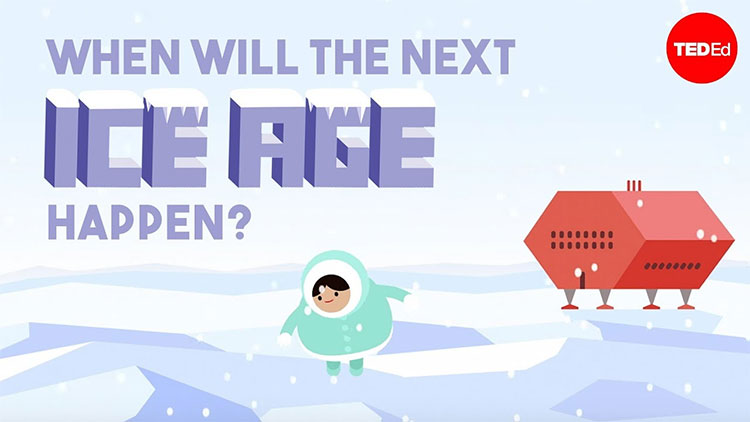When will the next ice age take place?
Twenty thousand years ago, the Earth was a place known for its extremely cold climate with many large ice sheets thousands of meters thick covering most of North America, Europe, Asia , . and ruled by species. Mammoth mammoth. This period is often known as the ice age.

About a million years ago, there have been 10 ice ages. Earth's climate is always fluctuating, there are times when hundreds of millions of years exist, this planet has no ice at the two poles. Since there was no ice, at that time the sea level had sometimes increased by 70m. But about 700 million years ago, the Earth was almost submerged in ice and likened to the 'giant snow globe'. So what makes the Earth's climate so powerful?

One of the major factors is due to atmospheric CO 2 - a gas that holds heat. Natural processes such as volcanic phenomena, rock weathering and accumulation of organic substances that take place over millions of years have significantly changed the concentration of CO 2 in the atmosphere.

The Earth is gradually cooling off in a few thousand years.
In a million years ago, CO 2 concentrations were only relatively low and the ice ages would take place in a recurring cycle of the Earth around the Sun. When the Earth turns, because it is on the tilt axis, the amount of light falling on the surface of different places also changes. Besides the Earth's elliptical orbit, the temperature changes depending on when the Earth is near or far from the Sun.
About every 100,000 years, these factors change to create an extremely cold climate that lasts for centuries. Cool temperatures in the summer are not enough to melt the winter ice, causing the ice to pile up over the years. Solar reflective panels of the universe make the temperature drop. At the same time, cold air pushes CO2 from the air into the ocean, making it colder and more ice.
About 20,000 years ago, this trend was overturned when the Earth changed its trajectory once again, making the summer sun more so that large pieces of ice melted. Sea level rises to 130m and CO 2 releases steam from the sea back into the air. By studying marine animal fossils, geologists say the temperature had peaked about 6,000 years ago and once again, the Earth transformed itself, the orbit began to change towards a New ice age. So what will happen to humanity in the future?
Based on the natural cyclical nature of climate records, scientists can easily guess that the Earth is gradually cooling off in a few thousand years . But this phenomenon suddenly turned upside down about 150 years ago. Why? The increasing density of CO2 in the atmosphere from the 19th century is directly proportional to the amount of fuel used. We know that when studying the amount of air trapped in Antarctic ice. The surge of CO 2 causes the Earth's temperature to rise by almost 1 degree centigrade.

During the ice age, mammoths dominated the Earth.
Ice cores and atmospheric research stations tell us that the amount of carbon dioxide is growing faster and more strongly than at any other time in the last 800,000 years. The computer forecasts that in 2100, the Earth will heat from 1 to 4 degrees Celsius in the future , depending on the amount of gas we will use.
How does that affect the ice in Greenland and Antarctica? The past climate change indicates that just a little hotter, melting ice will begin to happen and last for thousands of years. By the end of this century, the amount of melting ice could cause the sea level to rise by 30 to 100 cm, enough to affect coastal and island countries. If it is increased by 4 degrees Celsius enough to prolong the warming phenomenon for millennia, sea level can rise to 10m.
By learning about past climate patterns, scientists can understand more about the cause of ice formation on our planet for millions of years. And if we take action together to reduce CO 2 right now, we still have a chance to reduce ice melt and protect coastal areas.
- Location of water bottles
- 'Reveal' the most favorable place for aliens to observe the Earth
- Do you know where to be lonely and away from the most people on Earth?
- Duong Long tower may be the place where Cham king was buried
- The standard placeholder pronunciation that you often read before is
- In the loneliest place in the world
- Interesting findings about chimp's sleeping place
- The home of the most dirty spot bacteria school in the house
- Proper sleeping instructions help reduce wrinkles
- Unexpected benefits of being second in the competition
- The coldest place on Earth is actually ... even colder
- The 9 hottest places on the planet are still inhabited
 'Fine laughs' - Scary and painful torture in ancient times
'Fine laughs' - Scary and painful torture in ancient times The sequence of numbers 142857 of the Egyptian pyramids is known as the strangest number in the world - Why?
The sequence of numbers 142857 of the Egyptian pyramids is known as the strangest number in the world - Why? History of the iron
History of the iron What is alum?
What is alum?